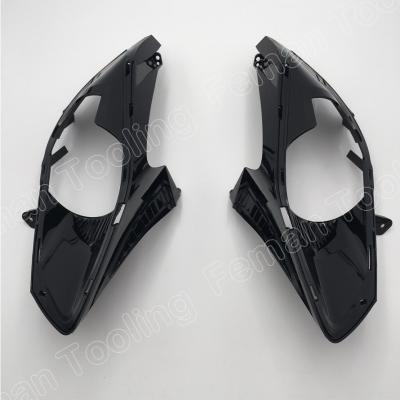ABS (Acrylonitrile Butadiene Styrene) injection molding is a widely used manufacturing process for creating components and products with excellent mechanical properties and versatility. Understanding the properties of ABS material and the appropriate injection molding conditions is crucial for achieving high-quality results. This article explores the ABS injection molding material, its properties, the injection molding processing conditions for ABS, and the classification of ABS plastic material grades. Additionally, we will emphasize the importance of collaborating with reputable ABS plastic injection molding supplier-Feman, custom ABS molding companies, and ABS plastic injection molding manufacturers, such as Feman, to ensure reliable and efficient production processes.
What Is the ABS Injection Molding Material?
ABS is a thermoplastic polymer composed of three monomers: Acrylonitrile, Butadiene, and Styrene. It combines the desirable properties of each monomer to create a material with excellent impact resistance, dimensional stability, and good processability. ABS is known for its ability to be easily molded and its wide range of applications across various industries.
ABS injection molding material is available in the form of pellets or granules. These raw materials are fed into an injection molding machine, melted, and injected into a mold cavity to form the desired shape.
What Properties Does the ABS Injection Molding Material Possess?
ABS injection molding material possesses several key properties that make it suitable for a wide range of applications:
Impact resistance: ABS has excellent impact resistance, making it capable of withstanding significant force or impact without breaking or cracking. This property is crucial for applications that require durability and structural integrity.
Dimensional stability: ABS exhibits good dimensional stability, meaning it maintains its shape and size even under changing temperature and humidity conditions. This property is essential for producing accurate and consistent parts.
Processability: ABS is easily processed through injection molding, allowing for the production of complex shapes and designs. It has a low melting point, good flowability, and fast cooling characteristics, making it suitable for high-volume production.
Surface finish: ABS parts can be molded with a smooth surface finish, reducing the need for post-processing or additional finishing operations. This property is advantageous for achieving aesthetically pleasing products.
Chemical resistance: ABS is resistant to many chemicals, oils, and greases, making it suitable for applications that come into contact with various substances.
Electrical insulation: ABS exhibits good electrical insulation properties, making it suitable for applications in the electrical and electronics industry.
Flame retardancy: ABS can be formulated to have flame-retardant properties, meeting safety standards for certain applications.
What Are the Injection Molding Processing Conditions of ABS?
To achieve optimal results in ABS injection molding, several processing conditions need to be considered:
Melt temperature: The melt temperature of ABS typically ranges from 190°C to 260°C. It is important to maintain a consistent and appropriate melt temperature to ensure proper melt flow and minimize the risk of degradation.
Mold temperature: The mold temperature for ABS injection molding typically ranges from 40°C to 80°C. Controlling the mold temperature is crucial for achieving proper cooling and solidification of the part.
Injection speed: The injection speed determines how quickly the molten ABS material is injected into the mold cavity. The appropriate injection speed depends on factors such as part design, wall thickness, and material flow requirements.
Injection pressure: The injection pressure is the force applied to inject the molten ABS material into the mold cavity. The optimal injection pressure depends on factors such as part geometry, wall thickness, and material flow characteristics.
Cooling time: Sufficient cooling time is essential for the proper solidification of the molded part. Cooling time is influenced by factors such as part thickness, mold design, and cooling system efficiency.
Collaborating with experienced ABS plastic injection molding suppliers, such as Feman, ensures access to expertise in optimizing these processing conditions for the specific ABS material grades and desired product specifications.
ABS Plastic Material Grade Classification
ABS plastic material is classified into different grades based on its properties and intended applications. Some common classifications include:
General-purpose ABS: This is the most commonly used ABS grade, offering a balance of properties suitable for a wide range of applications.
Flame-retardant ABS: This ABS grade is formulated to have enhanced flame-retardant properties, making it suitable for applications requiring fire safety.
Conductive ABS: Conductive ABS is modified to have electrical conductivity, making it suitable for applications in the electronics industry that require static dissipation or electromagnetic shielding.
High-impact ABS: This ABS grade is formulated to have enhanced impact resistance, making it suitable for applications that require superior toughness and durability.
Collaborating with custom ABS molding companies and ABS plastic injection molding manufacturers allows for selecting the appropriate ABS material grade based on specific application requirements.
Conclusion
Understanding the properties and processing conditions of ABS injection molding is crucial for achieving successful and high-quality production outcomes. ABS injection molding material possesses excellent impact resistance, dimensional stability, processability, and surface finish properties. Optimizing processing conditions such as melt temperature, mold temperature, injection speed, injection pressure, and cooling time is essential for achieving accurate and consistent results. Collaborating with reputable ABS plastic injection molding suppliers, custom ABS molding companies, and ABS plastic injection molding manufacturers, such as Feman, ensures access to expertise, quality production processes, and tailored solutions. By considering the properties and conditions of ABS injection molding, manufacturers can optimize their production processes and achieve superior products for various applications.
